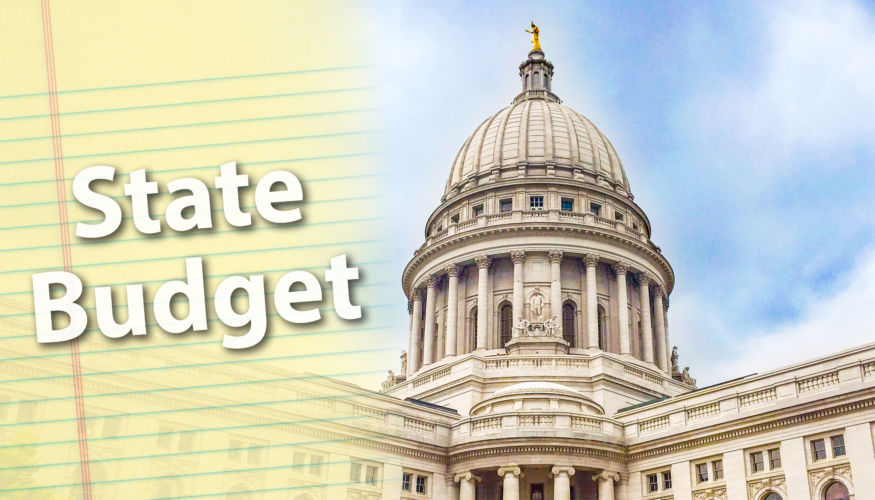Every two years, the state adopts a biennial budget concerned with funding state agencies, including key program areas that relate to wetlands. This biennium, the Wisconsin Wetlands Association’s budget focus identifies and promotes opportunities to integrate wetlands and floodplain restoration to improve program outcomes.
WWA has been promoting wetlands as solutions to practical problems like water quality, flooding, and erosion. This concept continues to draw interest from communities, agricultural producers, and others interested in newly exploring the age-old benefits of healthy wetlands and floodplains.
As it currently stands, Wisconsin’s wetlands and waterways are severely degraded, disrupting our hydrologic systems’ capacity to manage water. WWA is focused on promoting hydrologic restoration to restore the landscape’s natural capacity to manage water by reestablishing upper watershed wetlands and reconnecting channels and floodplains. Existing programs haven’t kept up with integrating these strategies to achieve better soil and water health.
Our review of the 2021-23 state budget identified several program areas where better integration would enable or encourage these approaches.
- Wetlands as solutions in agricultural landscapes– Wisconsin has robust programs that seek to support innovative partnerships and voluntary practices to improve soil & water health. Policymakers can strengthen this solution-oriented approach by explicitly authorizing agricultural producers to explore wetland restoration and floodplain reconnection to help reduce nitrates entering surface and groundwater and to reduce erosion that leads to soil loss and higher sediment loads in lakes and streams.
- Wetlands as solutions for flood-prone communities– Many Wisconsin communities are wrestling with higher precipitation frequencies, intensities, and consequent flooding. Existing programs meant to help communities address these concerns should be adequately funded and support restoration of upper watershed wetland storage and floodplain reconnection to reduce peak flows and flood damages.
- Wetlands to improve resilience – Wisconsin’s emergency programs that help local governments remove debris and rebuild public infrastructure following disasters are increasingly important. To strengthen these programs and the security of post-disaster investments in road, bridge, and culvert repair, these programs should also allow the assessment and restoration of upstream erosion hazards (i.e., loss of wetland storage and floodplain connection) as an eligible expense.
- Wetlands for wildlife and recreation – Investments in restoration improve habitat for wetland-dependent species and provide outdoor recreation opportunities for Wisconsin communities. Policymakers can support these goals by increasing the waterfowl stamp fee from $6.75 to $11.75 (the proceeds of which fund wetland restoration throughout the state) and reauthorizing the Warren Knowles-Gaylord Nelson Stewardship Program, which helps preserve and enhance the state’s water resources, particularly wetlands and riparian areas.
These are just a few select areas where integrating wetlands can help improve program outcomes. You can help encourage a positive 2021-23 state budget for wetlands by reaching out to your legislators and the Joint Finance Committee about why wetlands are important to you, and asking them to support wetlands as solutions in our state programs.
To find your legislators, you can use the Who Are My Legislators webpage and enter your address in the upper right-hand box. If you are interested in attending a public hearing, below is more information on the budget process and upcoming hearings.
To conveniently share your written comments with the Joint Finance Committee, also send your comments to the following email: budget.comments@legis.wisconsin.gov.
The State Budget Process and Public Hearings
The 2021-23 state budget process officially kicked off in February, with Governor Evers releasing his state budget proposal. Over the next several months, the budget proposal will be considered by the Legislative Joint Finance Committee and both the Assembly and Senate before finally returning to Governor Evers for his final action.
As in past budget cycles, the Joint Finance Committee recently announced there will be public hearings, including three in-person and one virtual from 10 am – 5 pm on the following days:
- Friday, April 9, 2021, UW-Whitewater, Whitewater, WI
- Wednesday, April 21, 2021, The Hodag Dome, Rhinelander, WI
- Thursday, April 22, 2021, UW-Stout, Menomonie, WI
- Wednesday, April 28, 2021, Virtual (Pre-registration will be required and available closer to the hearing at https://legis.wisconsin.gov/topics/budgetcomments/virtual.)
If you plan to attend an in-person hearing, expect to follow local health requirements for wearing masks and following spacing and room capacity guidelines. Each speaker will be given two minutes for their comments.
If you want to share written comments with the Joint Finance Committee, you may also use the following email: budget.comments@legis.wisconsin.gov.
Governor Evers also recently announced plans to hold a virtual listening session on Climate Change & Our Environment on Wednesday, April 21 at 6:00 pm. Pre-registration required.
Please feel free to share your comments with us, too, by emailing WWA’s Policy Liaison Jennifer Western Hauser at Jennifer.westernhauser@wisconsinwetlands.org.
Related Content
Wisconsin State Budget signed into law


![Capitol_superedited_EmilyBuck[1]](https://www.wisconsinwetlands.org/wp-content/uploads/2021/08/Capitol_superedited_EmilyBuck1.jpg)